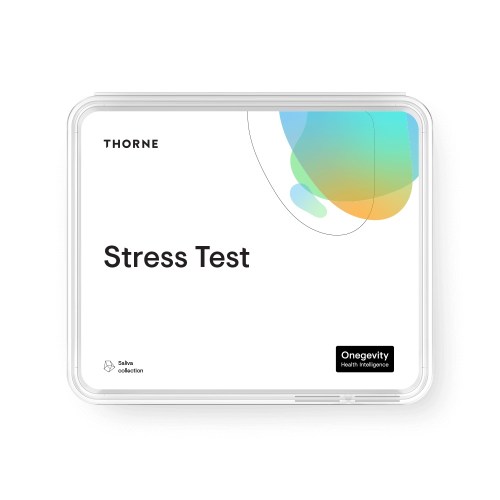advertisement
I Tested My Stress and It Was Through the Roof—Here’s the Expert-Backed Plan That’s Getting Me Through It
An editor shares how a home health test helped her find answers to her wellness questions and balance her overall stress levels.

Have you ever had a moment that made you think, hmm… maybe my body is trying to tell me something? Maybe it was a headache telling you to drink more water, or maybe it was your low energy level after a workout telling you to grab a carb-heavy snack. For me, it was when my normally mild periods suddenly became unbearably painful.
What was my body trying to tell me? At the time, I had no idea. It was a few months into the pandemic, and despite the onslaught of bad news making headlines, I felt like I was handling everything surprisingly well (spoiler: I actually wasn’t).
I knew my period symptoms meant something was probably off with my hormones, so I decided to take a hormone test to give me a better idea of what was going on in my body. All that stress I thought I was taking in stride? I was actually internalizing it, and it was skyrocketing my cortisol and DHEA levels, two of the body’s major stress hormones.

Thorne Stress Test — $156.00
“Having both cortisol and DHEA high is the perfect storm to throw both progesterone and estrogen out of whack,” says Amanda Frick, ND, executive director of medical affairs at Thorne. “Your body needs progesterone to create cortisol. If your cortisol level is high, then…essentially your body is ‘stealing’ progesterone to keep up with the high cortisol output. A low level of progesterone…can cause common premenstrual mood fluctuations, breast tenderness, and irritability, as well as making your periods heavier, longer, and more painful.”
Mystery, solved. But here’s where the story gets interesting: The dietitian I was working with recommended I start taking a lineup of supplements to support my stress levels (in addition to a few lifestyle changes to help me decompress), and it all actually worked. Among her recs were Thorne’s Basic Prenatal as my baseline multivitamin, plus vitamin B6, magnesium, ashwagandha, and several other nutrients.
How did I know it worked? Because less than a year after starting my supplement regimen, I checked in on my levels with Thorne’s at-home Stress Test, and both my DHEA and cortisol were back in normal range. And those period cramps that had left me curled up in bed? Reduced to mild discomfort, only for the first few hours of my period.
I’ve always been a huge proponent of listening to your body and advocating for yourself (and your health) until you find solutions that make you feel more like you. And after my experience with using home testing to find the answers I was searching for, I love that Thorne is making that process more accessible to more people with its lineup of 13 different health tests—all of them designed to provide a personalized, science-backed approach to health and wellness.
Want to try one out yourself, or just curious how it works? Keep reading for all the details on how an at-home health test might be able to help you achieve your wellness goals.
The process
Depending on which test you take (Thorne has options ranging from gut health to sleep to fertility), you’ll collect your samples in a variety of ways. For the stress test, all I had to do was spit into the provided collection tubes four times throughout the day, package them up in the pre-addressed mailer, and drop them off at the post office.
In about a week, my results were posted to my account. They came with easy-to-understand explanations of the science-y stuff, and an extensive list of recommendations (which is part of what makes Thorne unique from other at-home health test options) for managing my stress through my diet, daily activities, and of course, supplements. “You get the information you want about your health status without being left saying, now what?” Dr. Frick says.
The benefits
Although the main benefit of testing is collecting data and finding answers to your health questions, Thorne’s method offers some major benefits. First, Thorne provides tests that might not be offered at a traditional doctor’s office, and many of them allow you to skip the physical trip to the doc altogether with convenient at-home health test options.
Second, while $150+ is certainly an investment, it’s much more affordable than many other testing options. (For me, it was a worthwhile exchange when I considered how much I’d be willing to spend to put an end to the intensity of my period cramps.)
Finally, the supplement recs are legit. Thorne has staked its reputation on quality (supplements are tested four times for purity and potency), and Thorne is the only supplement manufacturer that collaborates with Mayo Clinic on wellness research. And when you get individualized recommendations for supplements that really work based on your actual health data, as Dr. Frick says, “that can make a huge difference in your path forward.” A path with more self empowerment and less period problems, in my case? That’s one worth following.
*These statements have not been evaluated by the Food and Drug Administration. This product is not intended to diagnose, treat, cure, or prevent any disease.
Sign up for the Well+Good SHOP Newsletter
Get exclusive deals on wellness, beauty, fitness, and food products that have been hand-picked by our editors.
Got it, you've been added to our email list.




